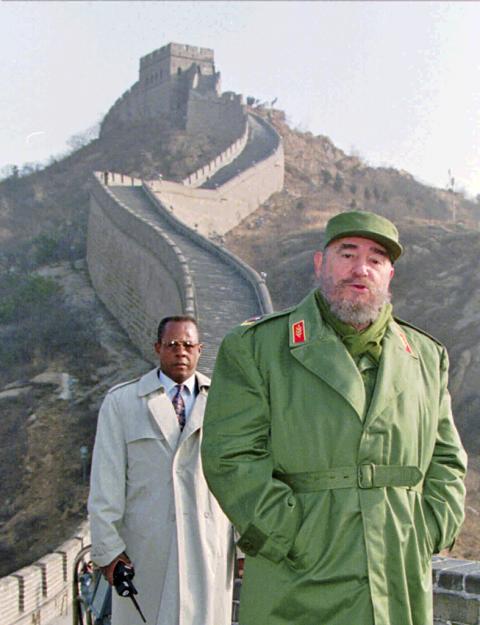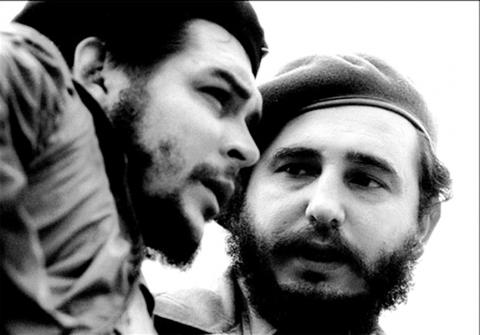Former Cuban president Fidel Castro, who led a rebel army to improbable victory in Cuba, embraced Soviet-style communism and defied 10 US presidents during his half-century rule, has died at age 90.
Cuba yesterday declared nine days of public mourning for its late revolutionary leader and said his ashes are to be buried at a ceremony on Sunday next week in Santiago de Cuba.
From yesterday until Sunday next week, “public activities and shows will cease, the national flag will fly at half mast on public buildings and military installations,” a statement from the Cuban Executive Committee said.

Photo: AP
Castro’s ashes are to be buried in the historic southeastern city after a four-day procession through the country, it added.
With a shaking voice, Cuban President Raul Castro said on state television that his elder brother died at 10:29pm on Friday.
He ended the announcement by shouting the revolutionary slogan: “Toward victory, always!”

Photo: AFP / ROBERTO SALAS / CUBADEBATE
Fidel Castro’s reign over the island-nation 145km from Florida was marked by the US-backed Bay of Pigs invasion in 1961 and the Cuban Missile Crisis a year later that brought the world to the brink of nuclear war.
The bearded revolutionary, who survived a crippling US trade embargo as well as dozens, possibly hundreds, of assassination plots, died 10 years after ill health forced him to hand power over to Raul Castro.
Fidel Castro overcame imprisonment at the hands of former Cuban president Fulgencio Batista, exile in Mexico and a disastrous start to his rebellion before triumphantly riding into Havana in January 1959 to become, at age 32, the youngest leader in Latin America.
For decades, he served as an inspiration and source of support to revolutionaries from Latin America to Africa.
His commitment to socialism was unwavering, though his power finally began to fade in the middle of 2006 when a gastrointestinal ailment forced him to hand over the presidency to Raul Castro in 2008, provisionally at first and then permanently.
His defiant image lingered long after he gave up his trademark Cohiba cigars for health reasons and his tall frame grew stooped.
“Socialism or death” remained Castro’s rallying cry even as Western-style democracy swept the globe and other communist regimes in China and Vietnam embraced capitalism, leaving this island of 11 million people an economically crippled Marxist curiosity.
He survived long enough to see Raul Castro negotiate an opening with US President Barack Obama on Dec. 17, 2014, when Havana and Washington announced they would move to restore diplomatic ties for the first time since they were severed in 1961.
He cautiously blessed the historic deal with his lifelong enemy nation in a letter published after a month-long silence.
Obama made a historic visit to Havana in March this year.
Carlos Rodriguez, 15, was sitting in Havana’s Miramar neighborhood when he heard that Fidel Castro had died.
“That’s not what I was expecting. One always thought that he would last forever. It doesn’t seem true.”
“It’s a tragedy,” said 22-year-old nurse Dayan Montalvo. “We all grew up with him. I feel really hurt by the news that we just heard.”
Fidel Castro Ruz was born on Aug. 13, 1926, in eastern Cuba’s sugar country, where his Spanish immigrant father worked recruiting labor for US sugar companies and later built up a prosperous plantation of his own.
Castro attended the University of Havana, where he received law and social science degrees. His life as a rebel began in 1953 with a reckless attack on the Moncada military barracks in Santiago. Most of his comrades were killed and Fidel and Raul went to prison.
He turned his trial defense into a manifesto that he smuggled out of jail, famously declaring, “History will absolve me.”
Freed under a pardon, Fidel Castro fled to Mexico and organized a rebel band that returned in 1956, sailing across the Gulf of Mexico to Cuba on a yacht named Granma. After losing most of his group in a bungled landing, he rallied support in Cuba’s Sierra Maestra mountains.
Three years later, tens of thousands spilled into the streets of Havana to celebrate Batista’s downfall and catch a glimpse of Castro as his rebel caravan arrived in the capital on Jan. 8, 1959.
The US was among the first to formally recognize his government.
The revolution thrilled millions in Cuba and across Latin America who saw it as an example of how the seemingly arrogant Americans could be defied.

SECURITY: As China is ‘reshaping’ Hong Kong’s population, Taiwan must raise the eligibility threshold for applications from Hong Kongers, Chiu Chui-cheng said When Hong Kong and Macau citizens apply for residency in Taiwan, it would be under a new category that includes a “national security observation period,” Mainland Affairs Council (MAC) Minister Chiu Chui-cheng (邱垂正) said yesterday. President William Lai (賴清德) on March 13 announced 17 strategies to counter China’s aggression toward Taiwan, including incorporating national security considerations into the review process for residency applications from Hong Kong and Macau citizens. The situation in Hong Kong is constantly changing, Chiu said to media yesterday on the sidelines of the Taipei Technology Run hosted by the Taipei Neihu Technology Park Development Association. With

CARROT AND STICK: While unrelenting in its military threats, China attracted nearly 40,000 Taiwanese to over 400 business events last year Nearly 40,000 Taiwanese last year joined industry events in China, such as conferences and trade fairs, supported by the Chinese government, a study showed yesterday, as Beijing ramps up a charm offensive toward Taipei alongside military pressure. China has long taken a carrot-and-stick approach to Taiwan, threatening it with the prospect of military action while reaching out to those it believes are amenable to Beijing’s point of view. Taiwanese security officials are wary of what they see as Beijing’s influence campaigns to sway public opinion after Taipei and Beijing gradually resumed travel links halted by the COVID-19 pandemic, but the scale of

A US Marine Corps regiment equipped with Naval Strike Missiles (NSM) is set to participate in the upcoming Balikatan 25 exercise in the Luzon Strait, marking the system’s first-ever deployment in the Philippines. US and Philippine officials have separately confirmed that the Navy Marine Expeditionary Ship Interdiction System (NMESIS) — the mobile launch platform for the Naval Strike Missile — would take part in the joint exercise. The missiles are being deployed to “a strategic first island chain chokepoint” in the waters between Taiwan proper and the Philippines, US-based Naval News reported. “The Luzon Strait and Bashi Channel represent a critical access

Pope Francis is be laid to rest on Saturday after lying in state for three days in St Peter’s Basilica, where the faithful are expected to flock to pay their respects to history’s first Latin American pontiff. The cardinals met yesterday in the Vatican’s synod hall to chart the next steps before a conclave begins to choose Francis’ successor, as condolences poured in from around the world. According to current norms, the conclave must begin between May 5 and 10. The cardinals set the funeral for Saturday at 10am in St Peter’s Square, to be celebrated by the dean of the College